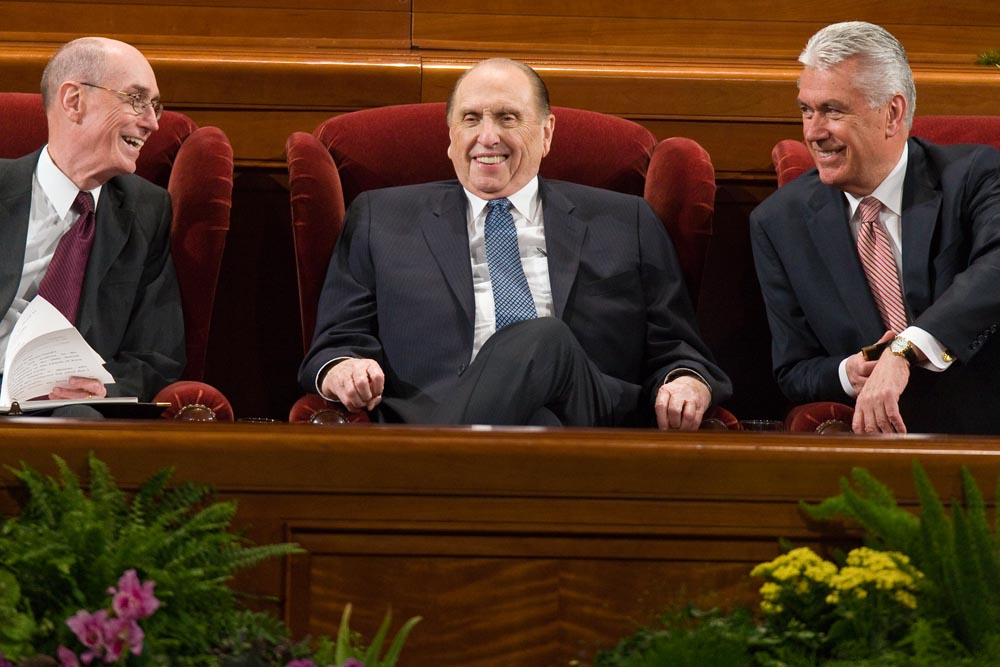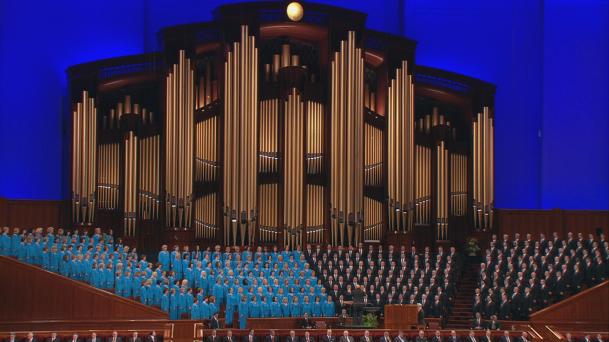Category: General Conference
-
Sunday Morning Session of General Conference
President Eyring is conducting this session of Conference, with music by the Tabernacle Choir. Invocation by Sister Linda S. Reeves, Relief Society Second Counselor. Benediction by Elder Kevin S. Hamilton of the Seventy. For this on-the-fly summary, text in quotation marks is a direct quote of a speaker, subject to correction when transcripts are available;…
-
GenConf: Priesthood Session Notes
President Uchtdorf conducted this opening session. Choir: For the Strength of the Hills Invocation: David L. Beck Choir: On This Day of Joy and Gladness President M. Russell Ballard: The Greatest Generation of Young Adults I know I speak for my brethren when I tell you that we wish it was possible for us to know…
-

They Spoke in General Conference as Ones That Had Authority
“And they were astonished at his doctrine: for he taught them as one that had authority, and not as the scribes.” –Mark 1:22 (see also Matthew 7:29) This scripture is often read to mean that Jesus expounded doctrine directly, rather than citing repeatedly what others had taught before (see some detailed discussion here). As Ellicott…
-

Laughing through General Conference
No one comes to General Conference for the jokes. And yet, some of the conference moments I remember most clearly involve laughter. In 1997, after Elder Nelson gave a laudatory talk about President Hinckley, President Hinckley took the stand and said, “I thought we were conducting General Conference. It’s turned out to be a funeral.”…
-
Sunday Afternoon Session of General Conference
Welcome to the fourth or fifth or sixth session of General Conference, depending on how you count. Text in quotation marks are verbatim quotes but not 100% guaranteed; other text is my summary of their remarks. [My comments inside brackets.] Music by the Choir. President Eyring conducting (he thinks it’s the fifth session), President Monson…
-
Sunday Morning Session of General Conference
We spent yesterday listening to General Conference while assembling IKEA furniture in the hopes that the spirit of the meeting would help reduce the desire to curse associated with strange pictorial instructions and screw heads that really want to strip. It went as well as could be expected. This morning I read about theology, love…
-
GenCon: Priesthood Session
Welcome to T&S’ coverage of the Priesthood Session of General Conference. We welcome your comments. . Chorus: Rise Up O Men of God President Henry B Eyring is conducting this session. Chorus: Medley of Primary Songs Elder Quentin L. Cook — Choose Wisely “How do you expect me to catch the ball when I am…
-
GenConf–Saturday Morning
President Eyring conducted the Saturday morning session. Direct quotations are in quotation marks (from my notes). Other text is my summary of what was said.
-
General Women’s Meeting
It is my nature to be cynical and critical and to focus on flaws, so when I tell you that the General Women’s Meeting was nearly perfect, that’s really saying something.
-

GenCon: Sunday Afternoon Session
Welcome to T&S’ fifth and final round of coverage of General Conference. We welcome your comments. President Dieter F. Uchtdorf is conducting this session of Conference. Chorus: Sweet is the Work. Prayer: ? Chorus: I Stand All Amazed. President Boyd K. Packer — The Witness “Almost mid-sentence it happened. I could not describe to you what…
-

GenCon: Sunday Morning Session
Welcome to T&S’ fourth round of coverage of General Conference. We welcome your comments. Chorus: Come We that Love the Lord President Henry B. Eyring is conducting this session of Conference. Chorus: On This Day of Joy and Gladness Prayer: Élder L. Whitney Clayton Chorus: Let Us All Press On President Dieter F. Uchtdof —…
-
Priesthood Session: A Personal View
I attended priesthood session at my local chapel. About sixty men and boys in attendance. One woman. It was snowing when I left home. I decided to reward my choosing the right with good consequences, so I stopped by my local Wendy’s and bought a small vanilla Frosty. On the way I listened to a…
-

GenCon: Saturday Afternoon Session
Welcome to round two of T&S sort-of live coverage of General Conference. President Eyring conducted this afternoon session with President Monson (in attendance) presiding. Opening prayer by Ian S. Ardern, a Seventy, and music by an Institute Choir from Orem, Utah. Direct quotations of a speaker are given in quotation marks; other text represents my…
-

GenCon: Saturday Morning Session
Welcome to T&S sort-of live coverage of General Conference. President Uchtdorf conducted this opening session with President Monson (in attendance) presiding. Opening prayer by Carl B. Cook, a Seventy, and music by the Mormon Tabernacle Choir. Direct quotations of a speaker are given in quotation marks or blockquote form; other text represents my own summary…
-
Sunday Afternoon Session
Conductinng: Elder Henry B. Eyring Elder Quentin L. Cook: Lamentations of Jeremiah: Beware Of Bondage Turning from the worship of the true and living God and worshipping false gods like wealth and fame and engaging in immoral and unrighteous conduct result in bondage in all its insidious manifestations. These include spiritual, physical, and intellectual bondage…
-
Sunday Morning Session
President Dieter F. Uchtdorf conducting. President Henry B. Eyring: To My Grandchildren I have seen those same tears of happiness in the eyes of someone who recounted the words of an apostle of God: He had said to her, after a searching and tender interview: “I forgive you in the name of the Lord. He…
-
Priesthood Session
President Henry B. Eyring conducting. Elder L. Tom Perry: The Doctrines and Principles Contained in the Articles of Faith This doctrine is to the Church like a battery is to a cell phone. When you remove the battery from your cell phone it becomes useless. A church in which true doctrine is no longer taught is…
-
Saturday Afternoon Session
President Uchtdorf conducting. President Henry B. Eyring: Sustaining votes of the General Authorities and Church Officers
-
Saturday Morning Session
President Eyring conducted this opening session. President Thomas S. Monson: Welcome to Conference I am happy to announce that two weeks ago the membership of the Church reached fifteen million. It has scarcely been one year since I announced the lowering of the age of missionary service. Since that time, the number of full-time missionaries…
-
Sunday Afternoon Session
President Uchtdorf is conducting this final session of Conference, with music by the Tabernacle Choir. Invocation by another female, Sister Stephens — they seem to be everywhere this Conference! Benediction by a male Seventy. Direct quotes of a speaker are in quotation marks, otherwise the text is my summary of their remarks.
-
Sunday Morning Session
President Henry B. Eyring is conducting this session of General Conference. Choir — Go Forth in Faith Conducting — President Henry B. Eyring Choir — Let Zion in Her Beauty Rise Invocation — Elder Steven E. Snow President Dieter F. Uchtdorf — “The Hope of God’s Light” It is part of our condition as mortal…
-
Priesthood Session
President Uchtdorf conducted the priesthood session, which included a number of strong and inspiring talks. Choir — Arise, Oh God, and Shine Invocation — Elder Ronald W. Rasband Choir — Nearer My God to Me Elder Robert D. Hales — “Stand Strong in Holy Places” Brethren, if we are faithful in the priesthood, this armor…
-
Saturday Afternoon Session
President Eyring conducted the afternoon session. President Uchtdorf read a long list of sustainings and releases, notably releasing President Dalton of the Young Women and calling a new President (Bonnie Lee Green Oscarson) and counselors. The annual audit report and statistical report were read: there are now 3005 stakes and 347 missions. In what follows,…
-
Saturday Morning Session
President Uchtdorf conducted this opening session. Opening prayer by a (male) Seventy and music by the Mormon Tabernacle Choir. Direct quotations of a speaker (based on my real-time listening) are given in quotation marks; other text represents my own summary of their remarks.
-
My Notes on Priesthood Session, October 2012
I had planned on giving a brief summary of Priesthood Session tonight; unfortunately, some family/logistical issues kept me from getting to our Church building until well after the session had started, so I’m afraid I missed the first speaker. And I’d planned on bringing my iPad to take notes on, but I accidentally left it…
-
An Immodest Proposal
As Sarah noted, Saturday and Sunday bring us our Fall semiannual General Conference. As part of our twice-yearly ritual, we’ll hear the Mormon Tabernacle Choir up to three times: one session of Conference Saturday, one session Sunday, and the Music and the Spoken Word broadcast before the first Sunday session.
-

A Mormon Holiday
Sometimes I am a little envious of my friends whose religions involve a year full of meaningful religious holidays that strengthen and define them both culturally and spiritually. Ramadan, for instance, is a sort of month-long holiday for Muslims, complete with special foods and lots of family time. When we lived in Tunisia, I was amazed at…
-
Sunday Afternoon Session
President Uchtdorf conducted the closing session of General Conference. Direct quotations of a speaker’s words (based on my notes) are given in quotes; other text is my summary of the remarks given. Any text in italics represents my own editorial comment.
-
Sunday Morning Session
President Eyring conducted the Sunday morning session, featuring talks by President Dieter F. Uchtdorf, Elder Russell M. Nelson, Elder Ronald A. Rasband, Sister Julie B. Beck, Elder D. Todd Christofferson and President Thomas S. Monson. Direct quotations (based on my notes) are given in quotes; all other text represents my summary of the remarks given.…
